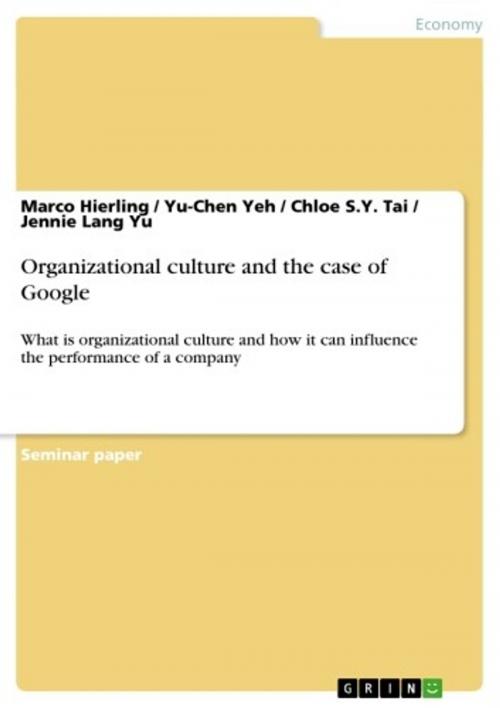Organizational culture and the case of Google
What is organizational culture and how it can influence the performance of a company
Business & Finance, Management & Leadership, Management| Author: | Marco Hierling, Yu-Chen Yeh, Chloe S.Y. Tai, Jennie Lang Yu | ISBN: | 9783638823678 |
| Publisher: | GRIN Verlag | Publication: | July 1, 2007 |
| Imprint: | GRIN Verlag | Language: | English |
| Author: | Marco Hierling, Yu-Chen Yeh, Chloe S.Y. Tai, Jennie Lang Yu |
| ISBN: | 9783638823678 |
| Publisher: | GRIN Verlag |
| Publication: | July 1, 2007 |
| Imprint: | GRIN Verlag |
| Language: | English |
Seminar paper from the year 2007 in the subject Business economics - Business Management, Corporate Governance, grade: 1,3, The University of Sydney, 42 entries in the bibliography, language: English, abstract: The culture concept evolved to conceptualize humankind's diversity, it asserts that we socially construct different understandings of nature and hence of the reality that surrounds us (Buchanan & Huczynski, 2004). Culture is ubiquitous, exists everywhere and has a significant influence. It affects not only the visible parts of individuals (behaviour and action) but also the invisible ones (beliefs and values). This complex interaction, which takes place on different levels, between individuals and groups within and with other organisations, can be seen as the primary determinant of behaviour in the workplace. The patterns of interaction between people and the external surroundings represent a complex environment which influences behaviour in organisations. Therefore, more and more managers are talking about changing their culture, creating a new culture, figuring out the impact of their culture, or preserving their culture. In this paper, the main focus is to define organizational culture and determine its influences on companies' performance. Firstly, there are several related questions that will be discussed: What is organizational culture? What are the key elements of it? How is it formed and can it be managed to contribute to a firm's performance? Secondly, we take a closer look at Google's organizational culture and research, to discover whether there is a link between its culture and its performance. Finally, a conclusion is drawn about the culture-performance link and the difficulties associated with this topic.
Seminar paper from the year 2007 in the subject Business economics - Business Management, Corporate Governance, grade: 1,3, The University of Sydney, 42 entries in the bibliography, language: English, abstract: The culture concept evolved to conceptualize humankind's diversity, it asserts that we socially construct different understandings of nature and hence of the reality that surrounds us (Buchanan & Huczynski, 2004). Culture is ubiquitous, exists everywhere and has a significant influence. It affects not only the visible parts of individuals (behaviour and action) but also the invisible ones (beliefs and values). This complex interaction, which takes place on different levels, between individuals and groups within and with other organisations, can be seen as the primary determinant of behaviour in the workplace. The patterns of interaction between people and the external surroundings represent a complex environment which influences behaviour in organisations. Therefore, more and more managers are talking about changing their culture, creating a new culture, figuring out the impact of their culture, or preserving their culture. In this paper, the main focus is to define organizational culture and determine its influences on companies' performance. Firstly, there are several related questions that will be discussed: What is organizational culture? What are the key elements of it? How is it formed and can it be managed to contribute to a firm's performance? Secondly, we take a closer look at Google's organizational culture and research, to discover whether there is a link between its culture and its performance. Finally, a conclusion is drawn about the culture-performance link and the difficulties associated with this topic.















